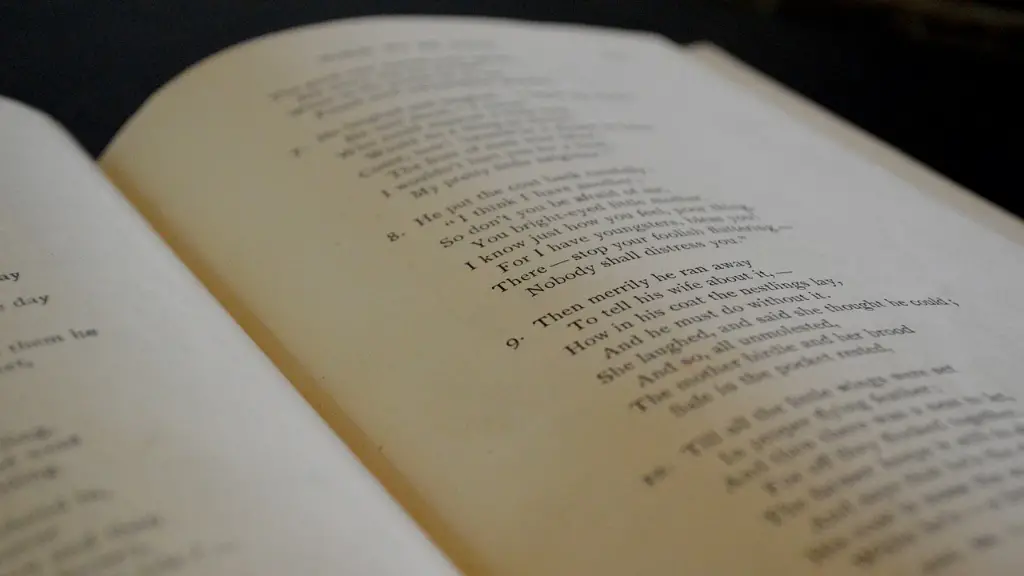Good poetry has been enchanting the world for centuries and continues to inspire its readers to this day. The concept of ‘good’ poetry is subjective, as taste and opinion vary from person to person. Yet, there’s something to be said for the qualities that set good poetry apart from its less-than-inspired counterparts. To begin to understand good poetry, it’s helpful to look at the aesthetics, form and also the content of the work being examined.
Often, the aesthetics of good poetry are judged based on the meticulous skill of its author. This can involve having a disciplined adherence to rhyme and meter, the use of powerful words and vivid imagery and having a cohesive set of material that connects to the poem’s underlying theme. An excellent poet is able to use enjambment and form to create a sense of natural flow in their writing.
A sense of effective structure is often a sign of well crafted poetry as well. Form helps determine how the words in each poem are arranged and can include the use of stanzas, couplets, sestinas, terza rima, sonnets and other classic poetic forms. Good poetry can be said to have a clear point of view, with well-crafted descriptions, limited repetition and the capture of the sometimes fleeting emotion of the original experience.
The content of good poetry is often what keeps readers engaged. In a good poem, the author uses language to create an argument or explore issues beyond the poem’s literal meaning. The use of symbols and metaphors to convey a deeper meaning and subtlety to the poem can be a way to craft an emotionally captivating poem that leaves readers with a profound sense of completion. Good poetry can transport its readers to another world, to a distant time or to their innermost thoughts and feelings.
The beauty and versatility of good poetry can make it appealing to a wide range of readers. Despite the increasing prominence that shorter works of literature, such as essays and short stories, have gained, the power and impact that good poetry carries can be unparalleled. Through its poignant, passionate language and its all-encompassing ability to explore themes of life, love and loss, good poetry is uniquely positioned to reach minds and hearts unassailable by other written forms.
Themes and Motifs
Good poetry often includes themes and motifs that help shape the poem’s message and affect how the reader experiences the poem. These themes can be recognizable and expected, such as the idea of love explored in a classic sonnet, or something more abstract and interpretive, like the idea of longing and loneliness in a free verse poem.
The author’s ability to interpret the themes and create an evocative atmosphere can make it easier for readers to understand and interpret the poem’s message. Through the use of auditory and visual imagery, as well as metaphor and allusion, good poetry can create an atmosphere of reflection and contemplation. Offering readers a framework in which to explore ideas, it can be a deeply satisfying and fulfilling experience.
Expressive Potential
Though often seen as Classical, traditional poetry, good poetry can also be revolutionary in nature as well. Poetry can serve an array of purposes and has been used throughout history to speak truth to power and to create social, political and economic change. For example, political poetries in East and South Asia have an ancient history, with authors looking beyond the immediate to understand the world they live in and express their thoughts throughout their works.
Good poetry allows authors to explore the hidden depths and potentials of language, with its vivid expressions and visual details. Poets write to capture and convey the emotions, musings, and perspectives of their lives in a beautiful, abstracted way. Good poetry opens up a realm of possibilities for its authors to let their words speaks for themselves and create their own unique expression.
Variety of Perspectives
The openness of good poetry makes it possible for authors to come from a variety of perspectives, including those from different cultures. This helps to diversify the type of literature that’s available for readers to explore. Good poetry can help readers gain a greater understanding of cultures and people from different parts of the world and how they view the same issue or theme from diverse perspectives.
Within good poetry, there is endless potential. Authors have the freedom to express their own thoughts, interpretations and emotions in the form of their work. Just as there is no one way to create a poem, readers’ interpretations of a work of literature can greatly vary. In this way, good poetry is a deeply personal experience that can only be fully appreciated by the reader.
Motivational Power
The motivational powers of good poetry are to be revered as well. Much like music, good poetry can have the ability to touch its listeners on a deeply profound level. It can speak to the doubts, fears and aspirations of its readers, providing solace to the ailing soul and courage to the wanderer. It can offer an escape from the real world in which we live and remind readers of the beauty of imagination, thought and empathy.
The complexity of poetry can sometimes be daunting but its rewards are immeasurable. Good poetry can captivate readers with its inventive and sometimes user-friendly writing. Its beautiful language, captivating imagery and powerful expression can create a lasting impression that connects to readers and invites them to explore more of what poetry has to offer. Its magical ability to draw out emotions and inspire its readers to see the world in a different way makes it a wonderful art form.
Conclusion
Good poetry is an art form like no other. It has the potential to evoke powerful emotions or tap into specific ideas and ideas, while capturing the beauty and fragility of life. It gives readers a glimpse into the mind and soul of its author and provides readers with an imaginative experience that is as enriching as it is inspiring. By allowing authors to explore the realms of their own thoughts and perspectives, and by captivating readers through vivid language and evocative images, good poetry is sure to stand the test of time.



